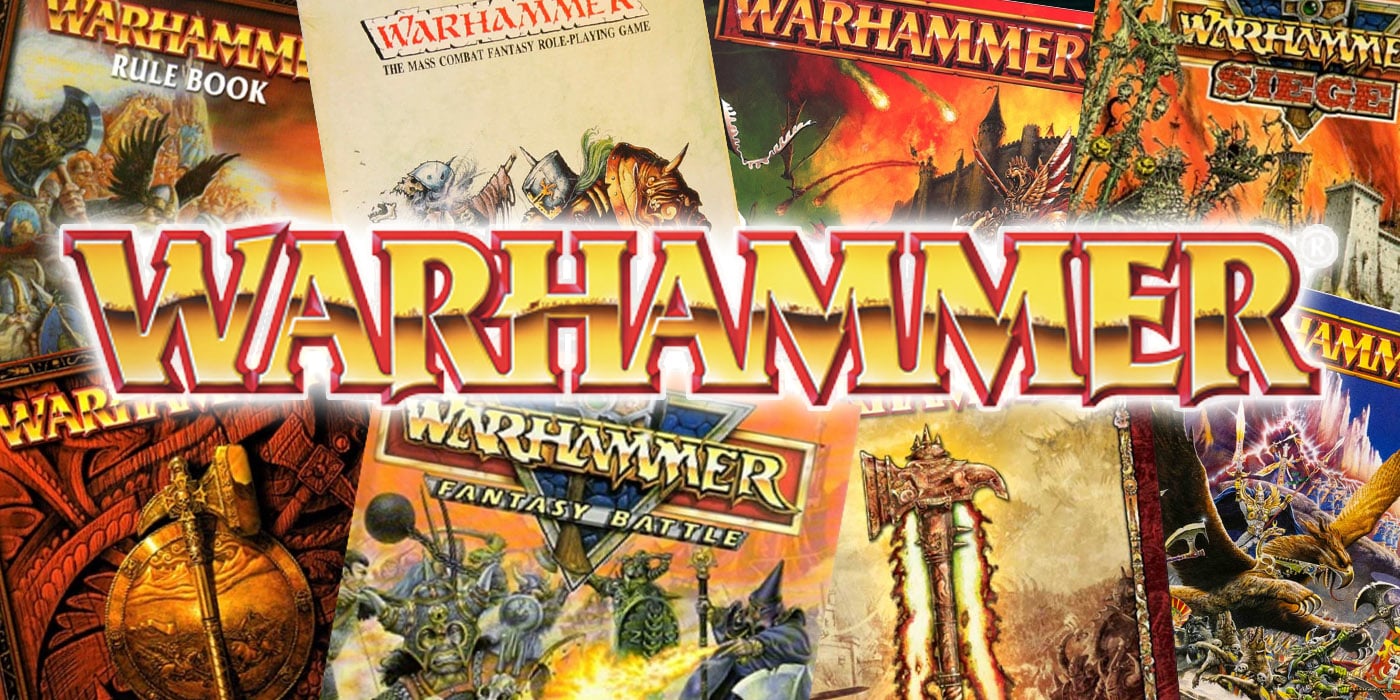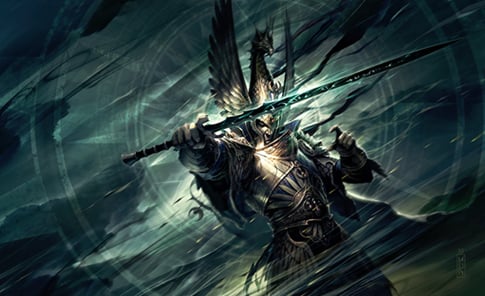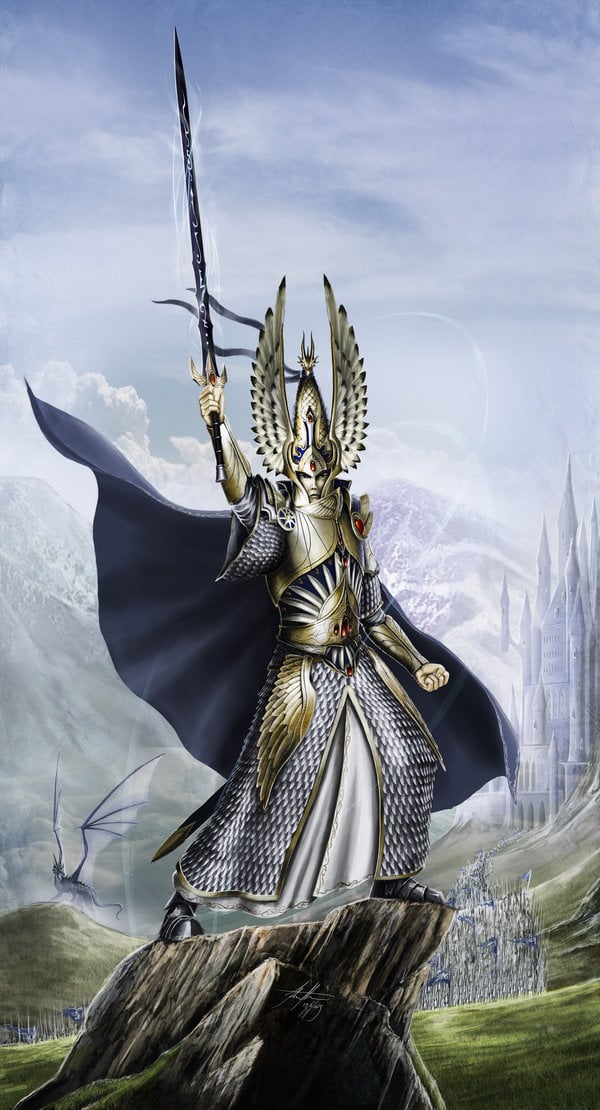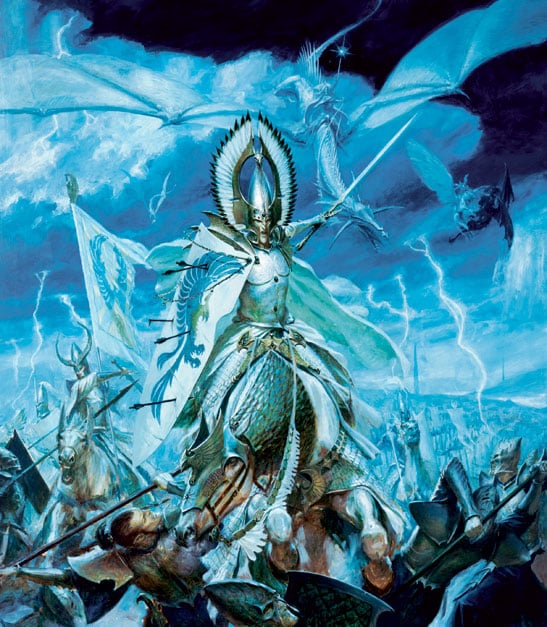End Times: Khaine – Tyrion Avatar of Khaine Review

Among the ancient heroes of Ulthuan, none weave a more tragic tale around themselves than Tyrion. But how does he perform on the tabletop.
Since birth the twin brother of Teclis has borne the curse of Aenarion as keenly as his physically maligned sibling, manifesting instead as rage and psychotic outbursts. His lineage marked him for a greater purpose regardless of whether he wanted to face it or not, leading to him being hunted by assassins and daemons even as a relative youth. Despite all the odds stacked against him, the young prince quickly established himself as the greatest warrior of Ulthuan and perhaps the most skilled the continent had ever seen, certainly a superior combatant to the far older Witch-King, Malekith. Countless times he traded his blood and rest away to defend his people against the evil constantly plaguing its shores, and even standing tall as a beacon of light to the other Forces of Order throughout the world.
Still, no matter how many victories he sowed or how many champions of destruction he defeated, the black curse of his forebear ever returned to claim Tyrion’s waking hours. In End Times: Khaine, the sins of Aenarion finally broke the legendary defender of Ulthuan as he was gripped by despair and rage at the apparent loss of both his wife and daughter; with a ferocity and determination unalike to the noble knight he once was, Tyrion drew forth the twisted Widowmaker and doomed himself to oblivion. To die without the aid of his greatest friends, his own brother and wife, to realize only at the precipice the monster he had become. For one that should have been known as the saviour of all Elves, Tyrion alone was the reaper that slaughtered all before him and almost sealed the annihilation of the species. Even the greatest of heroes can fall into darkness, and nowhere is this more evident than in the heart-breaking tale of a man who was destined to enact the role of Khaine in the retelling of the fabled Rhana Dandra, the Elvish apocalypse, even though he was once the shield that stood alone between his people and their end.
Tyrion, Avatar of Khaine
Despite Khaine being the titular character of the latest End Times book and Tyrion wielding the most powerful weapon ever created, earning his status as the Avatar of Khaine, Tyrion disappointingly is probably the weakest overall character introduced as a result of the bitter elven civil war. Before I explain in detail why this is the case, let me first address your concerns; Tyrion is indeed one of the most brutal melee characters in the game and will statistically put Karl Franz Ascendant down in one round of combat before he can strike. Anyone that can accomplish such a feat is obviously worthy of respect seeing as the Emperor was considered the game’s most powerful single melee model before the release of End Times: Khaine, and this does make Tyrion worthwhile in a sense regardless. With six attacks base due to Frenzy at Weapon Skill 10 and Initiative 10 that will almost always re-roll to hit and go before opponents due to Always Strikes First, Tyrion lays claim to the title of “most skilled combatant in Warhammer Fantasy” as would befit both his own extensive skills and the fact that he has been augmented by Khaine’s power.
Being Strength 5 is nice but ultimately pointless outside of certain test-or-die spells because the Widowmaker wielded by Tyrion automatically wounds all opponents he hits, ignoring armour saves and multiplying each unsaved wound into D6 wounds. Basically, Tyrion kills characters and monsters better than any other model in the game barring perhaps Karl Franz Ascendant or Malekith the Eternity King; his only weakness is that he lacks the sheer number of attacks those latter two characters possess. A nice rule to signify the Widowmaker’s place as a divine weapon is that it can never be destroyed, though hilariously the Goblin End Times spell does allow a Goblin Shaman to steal it from Tyrion (which would explain why Tyrion is Strength 5 and re-rolls all failed to wound rolls). The fact that Tyrion isn’t a monster and is instead just regular cavalry presents a whole bunch of issues when compared to all the other combined monster profile characters such as Malekith or Mannfred, including that he is vulnerable to Killing Blow, has far fewer wounds overall, and lacks a Thunderstomp or Stomp himself. It would have made sense for Malhandir to be treated as a Monstrous Cavalry mount as he was when the 7th Edition army book was used in 8th Edition rules and would have made Tyrion quite a bit better, but alas I guess this wasn’t something the rules designers considered when testing him out.
Still, I would be lying if I said Tyrion was a fragile character as that couldn’t be further from the truth; 5 Wounds at Toughness 4 with a 1+ armour save and 4+ ward save would make any of the non-End Times characters look on with envy, while being able to hide in units unlike his monstrous counter-parts does give him a huge edge with regards to overall survivability. Players just need to be aware that Tyrion is vulnerable to Killing Blow and doesn’t have the sheer amount of wounds as many of the other combined monster profile characters. The only problem then becomes trying to figure out which unit best suits Tyrion seeing as Dragon Princes with the Banner of the World Dragon are unavailable; your two primary choices are Cold One Knights and Doomfire Warlocks, each having their own respective advantages and disadvantages. Tyrion’s Movement 10 will be wasted regardless of which unit you join so that is basically a non-issue, though choosing between either of those units isn’t easy. Warlocks traditionally are the best cavalry bus seeing as they are a Fast Cavalry unit, but Tyrion is not and thus wastes a big part of their appeal – though the 4+ ward save and ability to run a wall of 1+ armoured Masters at the front of the unit, added on to Tyrion’s very helpful Magic Resistance 2, still make for a truly nasty unit. Cold One Knights also function well and complement Tyrion well by eating through rank and file units better than Dragon Princes ever could, especially once the re-rolls to wound provided by Tyrion are taken into account.
On that note, the really nice support ability Tyrion provides in exchange for losing out on his very useful army book exclusive trait to dole out an 18″ Inspiring Presence at Leadership 10 is the fact that both he (not that he needs it) and friendly Elf units with Murderous Prowess re-roll all failed to wound rolls in close combat provided they are within 12″ of him. While I do feel Malekith’s benefit is better overall in conjunction with Martial Prowess when the two opposing forces fight each other, this nonetheless makes dedicated melee units in the Aestyrion list absolutely terrifying; Witch Elves basically get by without the need for a Cauldron of Blood, while Executioners become unparalleled monster-hunters. Being both Frenzied and Immune to Psychology can present some issues for Tyrion but generally Leadership 10 and his ridiculous melee damage output cover most of the deficiencies here, while having the Fireborn special rule also practically guarantees victory for the Avatar of Khaine when facing off against Malekith as the Phoenix King or some of the nastier monsters like a K’daii Destroyer.
Even if one manages to kill Tyrion they will likely be ruing the assumption that he can no longer hurt them as Tyrion can fully ignore an unsaved wound that would kill him on a 2+, losing his Magic Resistance (2) in the process. This applies regardless of how the final wound was dealt, meaning that Killing Blow, Multiple Wounds and test-or-die spells can all be averted through his Heart of Averlorn. That he ignores the deathblow entirely means that an opponent may very well be cursing after getting a lucky Killing Blow strike, only to find that Tyrion remains with however many wounds – up to five – before he fell prey to that. While it is essentially a sixth wound if the wounds are all stripped off one at a time, being able to ignore something that would kill Tyrion outright is a very handy ability. Curiously enough, though, Tyrion even has the ability to raise units of Skeleton Warriors identical to those found in the Vampire Counts book via an innate bound spell with a very high casting cost on each of its three different versions, summoning either 2D3+3, 3D6+2 or 4D6+1 Skeleton Warriors, respectively.
The average number of Skeletons raised by each variation are 10, 12-13 and 15, respectively, with a power level difference of five between each. Seeing as it takes roughly three dice to get an average casting roll of 10 or higher off, you are likely best off just using the basic 10+ to cast version. As much as this ability does eat up quite a few power dice, the fact that it is innate means it can be cast without risk of penalty, while providing Elven armies with free units each turn at the cost of three power dice is a pretty handy ability to have for an elite force. While one may just be better off using the Lore of Undeath, Tyrion allows you to summon basic infantry tarpits and redirectors without needing to invest a wizard fully into that lore. Another interesting facet to Tyrion is his trusted steed Malhandir, a horse with an incredible Movement 10 – wasted by joining any Aestyrion unit, unfortunately – and two Strength 4 attacks base at Initiative 5. However, unlike the regular version of Tyrion, the rules designers failed to distinguish which special rules apply to Tyrion specifically. The result is that Malhandir actually has three Strength 4 attacks due to Frenzy, and also benefits from Always Strikes First at Initiative 5 making his damage output roughly equivalent to a single Black Guard model with Frenzy.
Considering that Malhandir is an Elven Steed I do find this pretty impressive and it can certainly make a difference in a challenge if Tyrion somehow fluffs his rolls while also helping him to cleave through enemy units that much quicker. Overall, Tyrion is certainly a very impressive combatant and extremely difficult to kill even when compared to all the eight-wound monsters populating the End Times; unfortunately, I do question whether he is really worth his points when you consider that he is not a wizard. End Times: Khaine has dramatically changed the Magic phase and left heavy-weights such as Teclis and Malekith as some of the most powerful single models in the game as a result; when compared to Malekith in particular, Tyrion is better in combat in some respects but otherwise lacks the full mobility and awesome spellcasting capabilities the Phoenix King brings to the table. Mind, I still think he is a very nasty character that can absolutely wreck almost everything that gets in his way, be downright frustrating to kill and provide your army with a huge boost to their average damage output, but he doesn’t bring the sheer value of most of the other End Times: Khaine characters. I will rate him as a competitive choice only because he can summon chaff units – which is awesome for an Elf army – and is possibly the best melee character in the game, short only of maybe one or two competitors like Malekith and Imrik, and he is also hilariously hard to kill to boot. Heck, Tyrion is one of the only models in the game that can – assuming average rolls – kill Imrik in one round of combat (on a standard roll, yikes!) and usually only suffer two or three wounds in return (assuming Imrik charged) due to his 4+ ward save, 1+ armour save and 2+ ward save against flaming attacks which effectively nullifies Minaithnir’s Dragonfire.
Competitive? Yes.
Thank you all for viewing (and hopefully enjoying) my early impressions of Tyrion, Avatar of Khaine – even if I am still disappointed we didn’t get a true fiery incarnation of the Elvish God of War and Murder, Tyrion is nonetheless an awesomely powerful individual that makes the perfect leader for a Host of the Aestyrion. While he is definitely not the all-rounder that Malekith and Alarielle as the Incarnate of Life can claim to be, Tyrion is nonetheless a terrifying presence on the battlefield even if only because he can safely hide within units unlike the other combined-monster models.
If you have any thoughts or critiques for me in regards to article quality or Tyrion’s in-game performance, please let me know in the comments section below. Thanks again and have a nice day!




